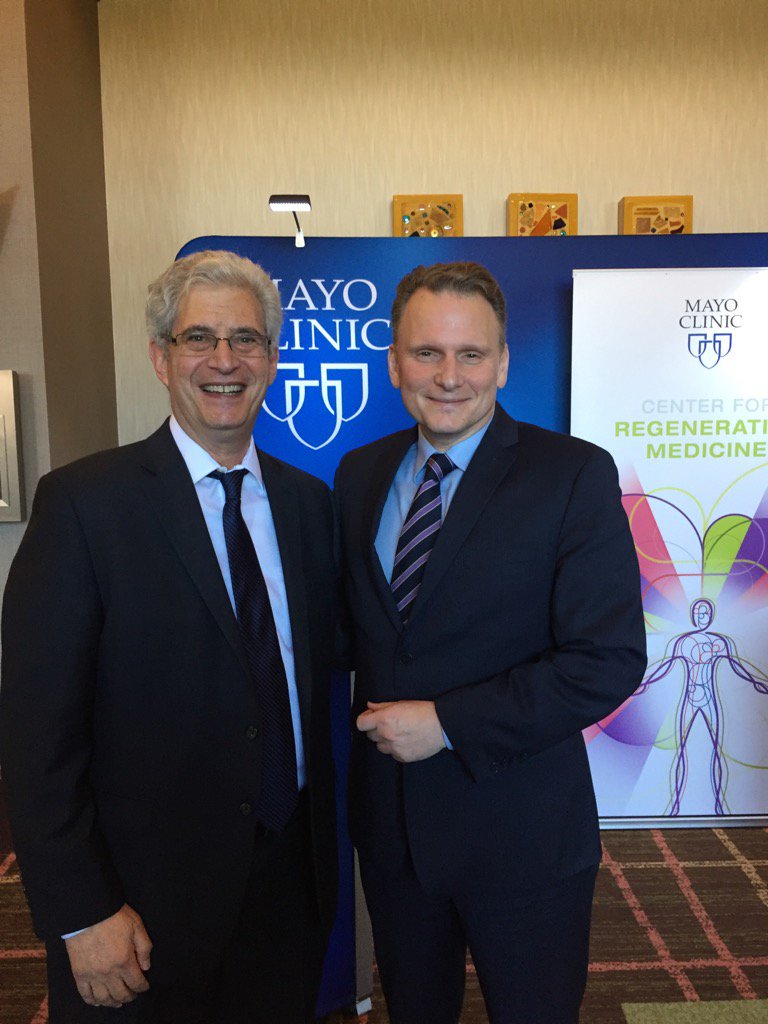Left to right are Bernard Siegel, J.D., keynote speaker, and Andre Terzic, M.D., Ph.D., medical director, Center for Regenerative Medicine, at the Mayo Clinic Symposium on Regenerative Medicine and Surgery.March 31, 2017
As a large medical practice, Mayo Clinic represents “where the rubber meets the road for research” that is going to impact the human population, according to Bernard Siegel, executive director, Regenerative Medicine Foundation. “Mayo Clinic has the credibility, the numbers and the prestige to be the game changer,” he said.
Siegel’s remarks were part of his keynote address at Mayo Clinic’s Symposium on Regenerative Medicine and Surgery, which was held recently in Scottsdale, Arizona.
“Mayo is going to be the institution that the world looks to as you incorporate these potentially curative technologies into the day-to-day medical practice,” Siegel said.
Regenerative medicine aims to replace, engineer or regenerate cells, tissues or organs to restore or establish normal function. Regenerative therapies amplify the body’s ability to heal itself, providing overall better health and quality of life. At the symposium, experts in regenerative medicine highlighted advancements in cancer care, cardiovascular disease, neurological conditions and musculoskeletal regeneration.
More than 60 presenters from Mayo Clinic and Arizona State University shared results of recent regenerative medicine efforts, ranging from preliminary research to advanced discoveries in tissue engineering, cell-based therapies and cell-free therapies. The symposium was moderated by Richard Hayden, M.D., deputy director of education, Mayo Clinic Center for Regenerative Medicine.
Dennis Gastineau, M.D., director of the Nyberg Human Cellular Therapy Laboratory on Mayo Clinic’s Arizona campus, described the laboratory as one of the key regenerative medicine platforms that has matured and expanded throughout the organization.
“Mayo is developing a set of platforms and expertise with the idea that it is the needs of the patients we are serving,” Dr. Gastineau said. “But we also have the science. That is the advantage, and it is tremendous in that respect.”
PLATFORMS ACCELERATE ADVANCES
Three platforms have emerged to accelerate the development of regenerative medicine based applications at Mayo Clinic: the Biotrust, the Biomaterials and Biomolecules Facility, and the Advanced Product Incubator. In a panel discussion, the platform directors talked about the ability to move products among the facilities during development.
Dennis Wigle, M.D., Ph.D., deputy director, Center for Regenerative Medicine Biotrust, said the vision always has been to function as a network hub within Mayo Clinic.
“One of the goals is to be an accelerator in the development of regenerative medicine applications and to be a connector of people, ideas and processes,” Dr. Wigle said. “Rather than being a single person in an isolated lab struggling with how to adopt some of these technologies, investigators are able to leverage the know-how and the infrastructure of the institution.”
Co-directors for the Biomaterials and Biomolecules Facility, Anthony Windebank, M.D., and Michael Yaszemski, M.D., Ph.D., discussed the value of being involved as physicians on small phase one clinical trials to establish patient safety.
“The idea of being able to make a biomaterial based device in-house and move forward to use in clinics is clearly very important,” says Dr. Windebank. “As we get closer to making more complex devices, it will be possible to work with one or two, or even three, platforms with an integrated oversight of our Good Manufacturing Practices facilities.”
The Biomaterials and Biomolecules Facility is a Current Good Manufacturing Practices grade laboratory. Current Good Manufacturing Practices refers to regulations enforced by the U.S. Food and Drug Administration and provides for systems that ensure proper design, monitoring and control of manufacturing processes and facilities.
Atta Behfar, M.D., Ph.D., director, Mayo’s Advanced Product Incubator, asked attendees to think about working with the platforms for phase one trials with an eye toward additional phases.
“At this point, our target is getting the safety studies established and accomplished at Mayo Clinic,” Dr. Behfar said. “The long-term aim is to build up the systems for later phase trials in partnership with industry.”
From the clinical perspective, Shane Shapiro, M.D., Orthopedic Surgery, said the real benefit is being able to work with experts like Dr. Behfar on potential products for the practice.
“It allows us to develop these products together,” Dr. Shapiro said. “When we demonstrate what our problem is on a foundational level, we can advance the practice and advance the use of the products to the patients who need them.”

